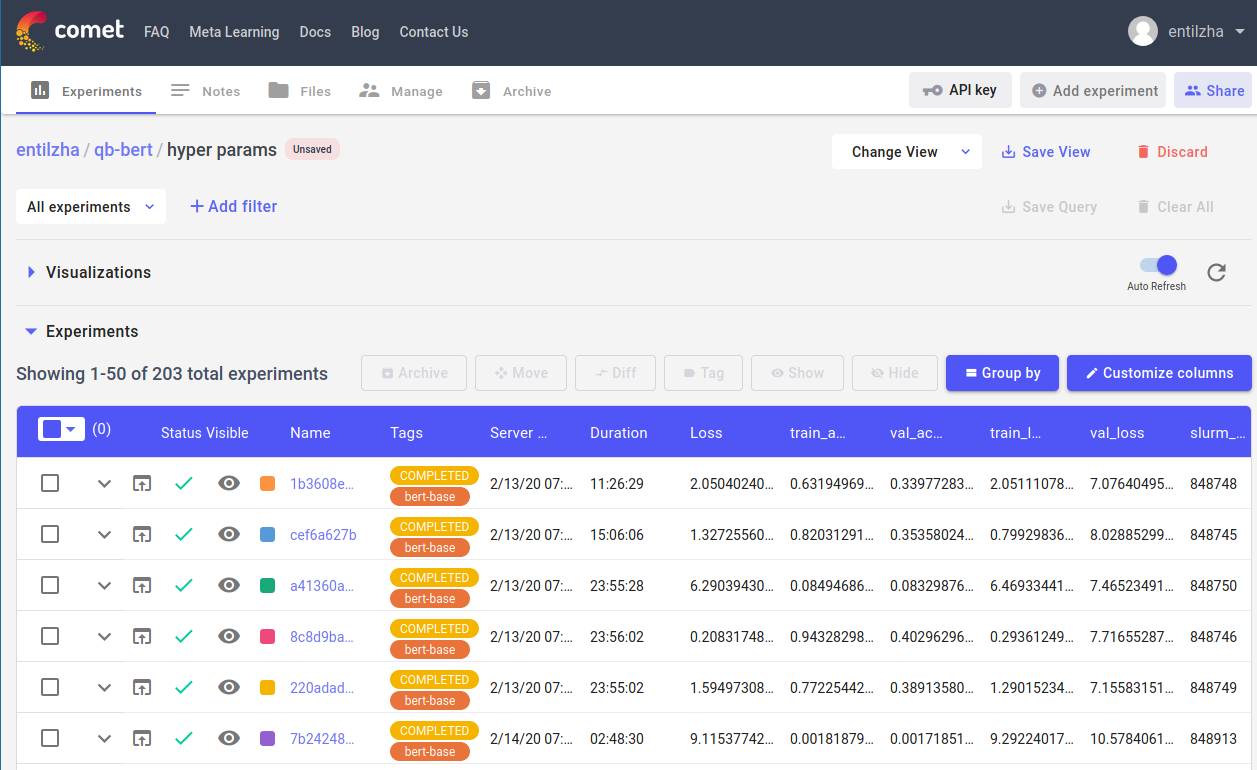In my last post on parameter sweeps, I mentioned that I found a nice way to combine AllenNLP and comet.ml.
In this post, I'll share my code that does this via the (experimental) callback trainer.
The 1.0 release of AllenNLP is currently actively in development and the callback trainer itself has been changing quite a bit (Issues 3269, 3519, and 3913).
Given that, everything in this post uses version 0.9.0 of AllenNLP.
The concept of the callback trainer is based on event based programming, and---at least as far as I know---popularized by keras. I liked the concept enough that when I switched to PyTorch I wrote my own version. The idea is that during model training, there are a number of important events which multiple pieces of code may be interested. Some of these are:
- When model training starts or ends
- When an epoch starts or ends
- When a batch starts or ends
For example, an early stopping mechanism may be interested in acquiring model predictions at epoch end, or tensorboard may be interested in batch statistics. Rather than the framework embedding each of these directly in the training loop, the framework instead collects a list of handlers for each event and runs them at the appropriate time.
In my training code, configuring the AllenNLP is as little code as changing the trainer key in the json/jsonnet model configuration:
trainer: {
type: 'callback',
callbacks: [
{
type: 'checkpoint',
checkpointer: { num_serialized_models_to_keep: 1 },
},
{ type: 'track_metrics', patience: 3, validation_metric: '+accuracy' },
'validate',
{ type: 'log_to_tensorboard' },
{
type: 'update_learning_rate',
learning_rate_scheduler: {
type: 'reduce_on_plateau',
patience: 2,
mode: 'max',
verbose: true,
},
},
]
This configuration makes it so that:
checkpoint: Models are saved at the end of every epochtrack_metrics: Early stopping is controlled by accuracy allowing for a maximum of three epochs without improvement before stoppinglog_to_tensorboard: Log batch statistics to a directory so that it can be visualized in tensorboard.update_learning_rate: Reduce the learning rate if there is no improvement after two epochs
Although (as far as I know), there isn't much official documentation, I found it quite helpful to look at the unit test file for help
In my code, I also added this callback { type: 'log_to_comet', project_name: 'qb-bert' } which when combined with my custom callback below yields a very useful way to look at experiment results.

I make a few assumptions:
* You've followed the comet.ml docs to install their package and created an account
* The callback configuration provides a comet.ml project name
* If there is a model configuration file, its referenced by the environment variable MODEL_CONFIG_FILE
* Similarly, if there is a log file, its referenced by SLURM_LOG_FILE
* The configuration file is in toml, but this could be easily changed.
* The model parameters are stored in a key params
* For AllenNLP to find this, the class needs to be imported using --include-package in the cli or as a regular python import in your code.
Github gist: comet_ml_callback.py
from typing import Text
import socket
import os
import comet_ml
import toml
from allennlp.training.callbacks.callback import Callback, handle_event
from allennlp.training.callbacks.events import Events
@Callback.register("log_to_comet")
class LogToComet(Callback):
def __init__(self, project_name: Text = None):
self._project_name = project_name
model_config_file = os.environ.get("MODEL_CONFIG_FILE")
if project_name is None or model_config_file is None:
self._experiment = None
self._conf = None
else:
self._experiment = comet_ml.Experiment(project_name=self._project_name)
slurm_log_file = os.environ.get("SLURM_LOG_FILE")
if slurm_log_file is not None:
self._experiment.log_asset(slurm_log_file, overwrite=True)
model_config_file = os.environ.get("MODEL_CONFIG_FILE")
if model_config_file is not None:
self._experiment.log_asset(model_config_file)
with open(model_config_file) as f:
self._conf = toml.load(f)
for key, val in self._conf["params"].items():
self._experiment.log_parameter(key, val)
self._experiment.add_tag(self._conf["name"])
self._experiment.log_other("hostname", socket.gethostname())
@handle_event(Events.TRAINING_END)
def training_end(self, _):
if self._experiment is not None:
self._experiment.add_tag("COMPLETED")
@handle_event(Events.EPOCH_END)
def epoch_end_logging(self, trainer):
if self._experiment is not None:
epoch = trainer.epoch_number + 1
for key, val in trainer.train_metrics.items():
self._experiment.log_metric(f"train_{key}", val, epoch=epoch)
for key, val in trainer.val_metrics.items():
self._experiment.log_metric(f"val_{key}", val, epoch=epoch)
slurm_log_file = os.environ.get("SLURM_LOG_FILE")
if slurm_log_file is not None:
self._experiment.log_asset(slurm_log_file, overwrite=True)
@handle_event(Events.ERROR)
def mark_run_failure(self, _):
if self._experiment is not None:
self._experiment.add_tag("FAILED")
The callback trainer will invariably change with AllenNLP 1.0 (excited!) and am hopeful that adapting this code will be straightforward.
Thanks and with the EMNLP deadline coming up (but extended to June 1st) perhaps this will help preserve sanity while running parameter sweeps and comparing results.
Disclaimer: I am using the academic plan on comet.ml, but otherwise have no affiliation or sponsorship.